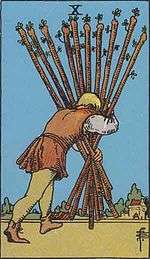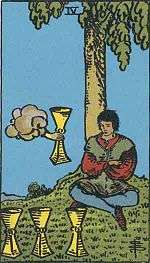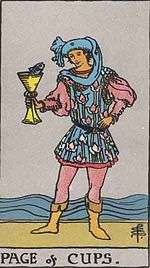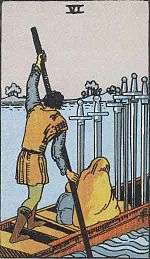Rider-Waite tarot deck
The Rider-Waite tarot deck (originally published 1910) is one of the most popular tarot decks in use today in the English-speaking world.[1] Other suggested names for this deck include the Rider-Waite-Smith, Waite-Smith, Waite-Colman Smith or simply the Rider deck or Waite deck. The cards were drawn by illustrator Pamela Colman Smith from the instructions of academic and mystic A. E. Waite, and published by the Rider Company.
Overview
While the images are simple, the details and backgrounds feature abundant symbolism. Some imagery remains similar to that found in earlier decks, but overall the Waite-Smith card designs represent a substantial departure from their predecessors. The Christian imagery of previous decks cards was toned down, for instance the "Pope" card became the "Hierophant", the "Papess" became the "High Priestess". The Minor Arcana are illustrated with images by Smith, where earlier decks had simpler designs for the Minor Arcana but aligning this deck with, for example, the Sola Busca Tarot. The symbols used were influenced by the 19th century magician and occultist Eliphas Levi.
Major Arcana
 0 – The Fool
0 – The Fool I – The Magician
I – The Magician II – The High Priestess
II – The High Priestess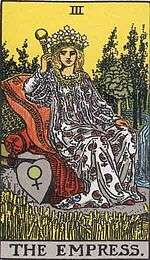 III – The Empress
III – The Empress IV – The Emperor
IV – The Emperor V – The Hierophant
V – The Hierophant VI – The Lovers
VI – The Lovers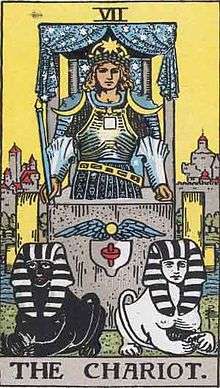 VII – The Chariot
VII – The Chariot VIII – Strength
VIII – Strength IX – The Hermit
IX – The Hermit X – Wheel of Fortune
X – Wheel of Fortune XI – Justice
XI – Justice XII – The Hanged Man
XII – The Hanged Man XIII – Death
XIII – Death XIV – Temperance
XIV – Temperance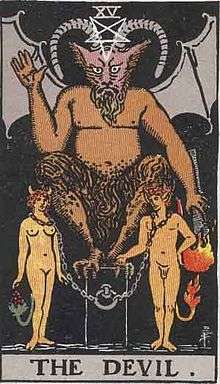 XV – The Devil
XV – The Devil XVI – The Tower
XVI – The Tower XVII – The Star
XVII – The Star XVIII – The Moon
XVIII – The Moon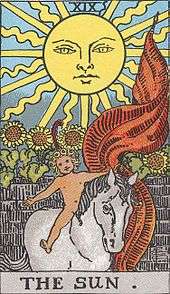 XIX – The Sun
XIX – The Sun XX – Judgement
XX – Judgement XXI – The World
XXI – The World
Minor Arcana
Wands
Pentacles
Cups
Swords
Publication
The cards were originally published in 1910 by the publisher William Rider & Son of London. The following year, a small guide by A.E. Waite entitled The Key to the Tarot was bundled with the cards, providing an overview of the traditions and history behind the cards, texts about interpretations, and extensive descriptions of their symbols. The year after that, a revised version, Pictorial Key to the Tarot, was issued that featured black-and-white plates of all seventy-eight of Smith's cards. Several later versions of the deck, such as the Universal Waite deck, copy the Smith line drawings with minor changes and added more coloring. The Smith-Waite Centennial Tarot Deck was published by U.S. Games Systems, Inc. in 2009 to commemorate the 100th anniversary of the creation of the deck. This deck is a faithful reproduction of the original deck published in 1910 and uses the muted colors originally chosen by Smith.[2]
Copyright status
In the United Kingdom, and by extension the rest of the European Union, copyright in the artwork for the deck will expire 70 years after the end of the year in which Smith died.[3] They will therefore not fall into the public domain until 1 January 2022.
In the United States, the deck fell into the public domain in 1966 (publication + 28 years + renewed 28 years), and thus has been available for use by American artists in numerous different media projects. U.S. Games Systems, Inc. has a copyright claim on their updated version of the deck published in 1971, but this only covers new material added to the pre-existing work (e.g. designs on the card backs and the box).
References
- ↑ Visions and Prophecies. Alexandria, VA: Time-Life Books, 1988.
- ↑ "Smith-Waite Centennial Tarot Deck". U.S. Games Systems, Inc. Retrieved 14 November 2016.
- ↑ "Ownership of copyright works - Detailed guidance". GOV.UK. 2014-08-19. Retrieved 2016-09-28.
External links
-
 Learning materials related to A Psychological Interpretation of the Tarot at Wikiversity
Learning materials related to A Psychological Interpretation of the Tarot at Wikiversity









